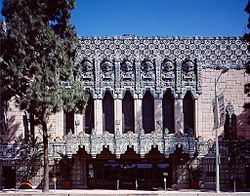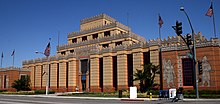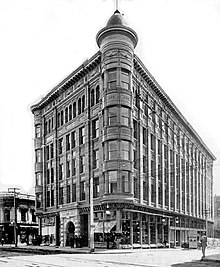Morgan, Walls & Clements

Morgan, Walls & Clements was an architectural firm based in Los Angeles, California and responsible for many of the city's landmarks, dating back to the late 19th century.[1] Originally Morgan and Walls, with principals Octavius Morgan and John A. Walls, the firm worked in the area from before the turn of the century.
Around 1910 Morgan's son O.W. Morgan was promoted, the elder Morgan retired, and with the emergence of designer Stiles O. Clements (1883–1966) the firm hit its stride with a series of theaters and commercial projects around MacArthur Park. Clements often worked in Spanish Colonial revival and Mayan revival styles, but their major project was the black Art Deco Richfield Tower, a commanding presence in downtown from its 1928 completion to its 1969 destruction. Walls did not live to see the completion of the building, as he had died in 1922.
Clements left the firm in 1937 to start his own practice, Stiles O. Clements & Associates, where he remained until his retirement in 1965.


Works
[edit]Their work includes:
- Grand Opera House, 110 S. Main St., Los Angeles, 1884 (Octavius Morgan and Ezra F. K
- Bullard Block, housing The Hub department store, 154-160 N. Main St., Los Angeles, 1895 (demolished 1925)
- Santa Clara Roman Catholic Church, Oxnard 1903
- The Bumiller Building, Los Angeles, 1906
- Parmelee-Dohrmann Building, 436–444 S. Broadway, Los Angeles, 1906 (demolished)
- Arcade Theater, 500 block of S. Broadway, Los Angeles, 1910
- Title Guarantee Block, now Jewelry Trades Building, 500 S. Broadway, Los Angeles 1913
- Van Nuys Apartments, Los Angeles, 1913
- The Haas Building, Los Angeles, 1915
- Artisan's Patio Complex, Los Angeles, 1918[2]
- The Olive J. Cobb Building, Los Angeles, 1924
- Hollywood Post Office, Los Angeles, 1925[3] (demolished)[4]
- El Capitan Theatre, Los Angeles, 1926
- Hollywood Chamber of Commerce Building, Los Angeles, 1926
- Music Box Theater, Los Angeles, 1926
- Belasco Theater, Los Angeles, 1926
- Ninth & Hill Building, Los Angeles, 1926
- Mayan Theater, Los Angeles, 1927
- Downtown Shopping News, Printing & Distribution Building, Los Angeles, 1927
- The First National Bank of Orange, Orange, 1928
- The Adams Square Building (1100 E. Chevy Chase Dr), Glendale, 1928
- Famous Department Store Long Beach branch, 1928-9, extant, city landmark building[5]
- Chapman Plaza, 3400 Block W. 6th St., Los Angeles, 1929
- The Deco Building, 1929
- Richfield Tower, Los Angeles, 1929 (razed)
- Samson Tire and Rubber Factory (now Citadel Outlets), Commerce, California, 1929-30. The façade was based on the palace of Sargon II.
- Security First National Bank, Los Angeles, 1929
- Adamson House, Malibu, California, 1930
- Leimert Theatre, Leimert Park, Los Angeles, 1931
- Pellissier Building and Wiltern Theatre, Los Angeles, 1931
- Dominguez-Wilshire Building (5410 Wilshire Boulevard), Los Angeles, 1931
- Hallmark Building, Hollywood, California, 1931 remodel[3]
- Professional Building, Phoenix, Arizona, 1932
- Julian Medical Building, Los Angeles, 1934[3]
- Bank of America Building (Los Angeles), 1935 remodel[3]
- Brooks Clothing Co. (after 1947: Harris & Frank, Miracle Mile, Los Angeles, 5450–4 Wilshire Boulevard at Cochran, opened 1936.[6]
- The Blackstone Building (Los Angeles), refurbished 1939
References
[edit]- ^ "Morgan, Walls, and Clements". Los Angeles Conservancy. Los Angeles Conservancy. Retrieved September 23, 2017.
- ^ Alan Michelson. "Artisan's Patio Building, Hollywood, Los Angeles, CA". University of Washington Pacific Coast Architecture Database. Retrieved August 20, 2024.
- ^ a b c d "National Register of Historic Places Registration Form - Hollywood Boulevard Commercial and Entertainment District". United States Department of the Interior - National Park Service. April 4, 1985.
- ^ Gregory Paul Williams (2005). The Story of Hollywood: An Illustrated History. BL Press LLC. p. 340. ISBN 9780977629909.
- ^ "Famous Department Store/RiteAid", Historic Landmarks, City of Long Beach
- ^ "Contract Let for New Structure". The Los Angeles Times. February 16, 1936. p. 62. Retrieved April 10, 2024.
Buildings by Morgan, Walls & Clements.
